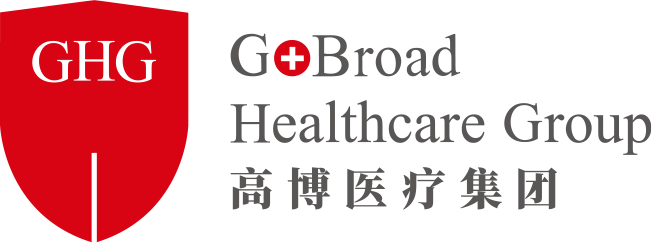Director Chunrong TONG from Our Hospital Gave a Speech at the 2018 International Conference on Cellular Immunotherapy in Zhoushan
The world's breakthrough in the field of cellular immunotherapy has become a hot topic. On April 19-20 this year, the 2018 International Conference on Cellular Immunotherapy, i.e., the Seminar on CAR-T19 Cell Immunobiological Therapy, was successfully held in Zhoushan, Zhejiang. Hundreds of domestic and foreign experts in the field of oncology participated in the conference to discuss the development of the CAR-T cell immunotherapy industry.
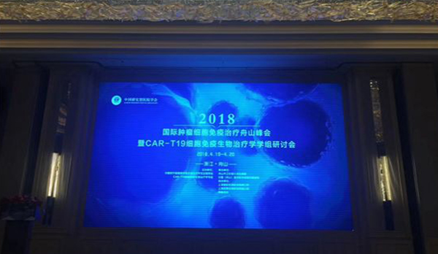
On April 1920, the 2018 International Conference on Cellular Immunotherapy, i.e., the Seminar on CAR-T19 Cell Immunobiological Therapy, was held in Zhoushan
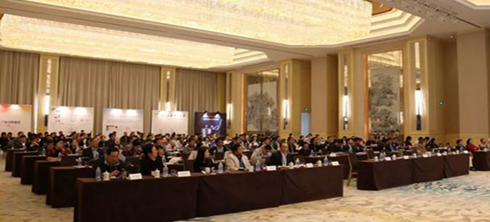
Hundreds of domestic and foreign experts in the field of oncology participated in the conference
At the conference, Chunrong TONG, on behalf of Beijing Boren Hospital, reported “the clinical outcomes and experience of CART therapy for refractory/relapsed B-cell malignancies (in cooperation with YaKe Biotech)”.
The report summarized the cases of refractory/relapsed B-cell malignancies treated with murine 19-CART, humanized 19-CART and humanized 22-CART from June 2017 to March 2018 and followed up until April 19, 2018.
A total of 56 patients with refractory/relapsed B-cell acute lymphoblastic leukemia (rrB-ALL) were treated with autologous murine 19-CART therapy. All patients had no response to chemotherapy and could not undergo allogeneic hematopoietic stem cell transplantation. In the era of no CART therapy, it is almost impossible to cure. Autologous murine 19-CART therapy achieved a complete molecular remission rate (CRm) of 96% (flow cytometry found negative minimal residual leukemia); the patients achieving CR were followed up for median 120 days (35-310 days), and 51/54 (94%) of patients maintained continuous molecular remission (CCRm) until the end of follow-up; 42 of them underwent allogeneic hematopoietic stem cell transplantation (allo-HCT), 39 maintained CCRm until the end of observation, and 8 receiving sequential humanized 22-CART, chemotherapy, etc. maintained CCRm until the end of observation.
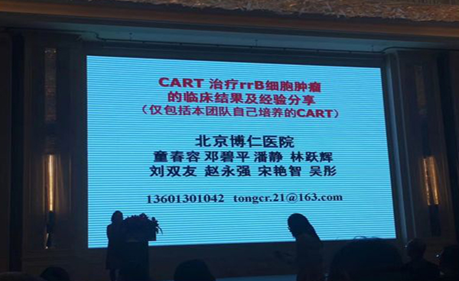
Director Chunrong TONG Gave a Keynote Speech at the Conference on Behalf of Beijing Boren Hospital
Autologous humanized 22-CART therapy was used for 15 patients with rrB-ALL, and their leukemia cells expressed CD22; 14 of them had no response or relapsed after previous 19-CART therapy, and one's leukemia cells did not express CD19, so autologous humanized CD22-CART therapy was selected, and these patients were almost impossible to cure. After autologous humanized 22-CART therapy, 87% of patients achieved CR, and 80% achieved CRm. Among the 13 patients achieving CR, 12 maintained CCRm until the end of observation for median 145 days (73-211 days), 8 of whom underwent allo-HCT, and 2 received sequential autologous humanized 19-CART therapy.
CART therapy was used to treat 30 patients who relapsed after allo-HCT. In the era of no CART therapy, there was almost no cure for such patients who did not undergo secondary transplantation, and the cure rate of secondary transplantation was very low. Initial CART therapy is selected according to the intensity of the immunolabeling on the leukemia cells of patients and whether the murine CART has been used previously; if 19-CART therapy has not been used and the leukemia cells express CD19 more strongly, the murine CD19-CART therapy is preferred; if murine CART therapy has been used and the leukemia cells express CD19 more strongly, humanized CD19-CART therapy is preferred; if 19-CART therapy has been used and leukemia cells do not express or weakly express CD19 and express CD22 more strongly, humanized 22-CART therapy is preferred. Twenty-one patients preferred 19-CART therapy, 18 of whom achieved CRm (86%), and 3 had significantly reduced extramedullary masses; subsequently, 13 patients received sequential humanized 22-CART therapy, 2 received radiotherapy, 20 maintained CCRm until the end of observation, and 1 died of hematological relapse. Nine patients preferred humanized 22-CART therapy, 7 of whom achieved CRm, 4 receiving sequential humanized 19-CART therapy maintained CCRm until the end of observation, and 5 died of relapse (3 cases), GVHD (1 case) or VOD (1 case).
Murine 19-CART therapy was used to treat 3 patients with refractory/relapsed diffuse large B-cell lymphoma and 3 patients with Burkitt's lymphoma and achieved good partial remission, and they were receiving sequential humanized CD22-CART or CD20-CART therapy, and the longest survival was 7 months.
Beijing Boren Hospital has treated more than 100 patients with advanced B-cell malignancies with CART therapy, and the efficacy has reached the internationally advanced level, which has brought hope of cure for these advanced patients and exhibited the comprehensive strength of Beijing Boren Hospital in the diagnosis and treatment of B-cell malignancies.
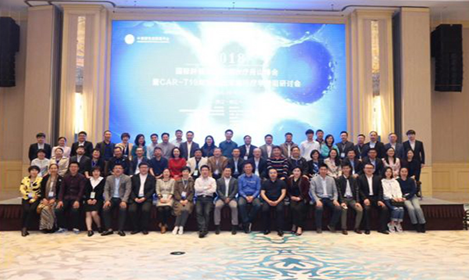
Photo With The Speakers
The report of Director Chunrong TONG was highly recognized and heatedly discussed by the participating experts, and it was also the demonstration of the scientific strength of Beijing Boren Hospital. Director Tong said that clinical academic research is a systematic project that relies heavily on the team and requires long-term investment, and Beijing Boren Hospital has excellent clinical and scientific research teams and academic environment. In the future, Director Chunrong TONG and the research team in Beijing Boren Hospital will shine on more academic stages at home and abroad.
Request an Appointment
Whether you are ready to make an appointment now or have questions for our expert team, we are standing by to help.
Email: international.service@gobroadhealthcare.com Phone: +86 010-83605002/010-83605200 Online Access









